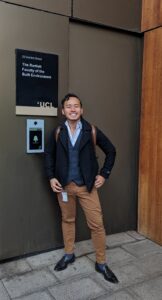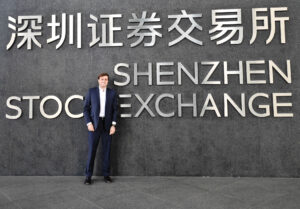by Xiangming Chen, Director, Urban Studies
Two former China summer program participants reflect on how the program and their time at Trinity shaped their career paths.
How Urban Studies Shaped My Path – Shaun Hoang ‘12

Coming to Trinity from Vietnam, I made a bold freshman-year decision to join the “River Cities of China” field research program, which changed my academic and professional trajectory. It made me realize that Urban Studies was the interdisciplinary pursuit I had been searching for — blending Economics, Sociology, Public Policy and History, and examining them through a critical lens. In China, for instance, we witnessed the engineering marvel of Chongqing—a metropolis of 30 million people built over steep cliffs, alongside the daily struggles of its displaced citizens and rural migrants living in it.
As a result, I was motivated to pursue a self-designed interdisciplinary major in Urban Economics and Development. My research interest focused on exploring the economic impact of purpose-led urban public policy, with a capstone thesis analyzing how more transit-supportive policies can improve the lives of residents in the Greater Hartford Region supervised by Professor Xiangming Chen. Then, having worked in the tech industry in Singapore for a decade with a refreshed perspective, I am now completing a postgraduate degree in Urban Spatial Science at the University College of London. In this institution, I aim to carry on the interdisciplinary spirit and expand into harnessing big data and urban analytics to solve our cities’ imminent challenges, such as mobility, sustainability, and social inequality.
Shaun recently co-authored an article published in ThinkChina, an English language e-magazine focused on China, with Xiangming Chen. View the article, titled “Riding the China-Laos Rail Railway: Landlocked Laos gets connected to China and beyond.”
From West Hartford to Shenzhen – Jack Shea ‘18

Cities breed innovation, and act as test beds for new and upcoming technologies. Chinese cities have become the centers where the majority of innovation is happening. While at Trinity, I would research new technologies (electric vehicles, batteries, autonomous vehicles, renewable energy, and 5G) in my free time, but wanted to learn more on how cities and companies in these fields work together to grow and develop. The Urban Studies summer program gave me the opportunity to see this city-company relationship in action. I saw China shift away from being an imitator to an innovator in new, disruptive technologies that will power and move the future world. After coming back from the trip, I immediately added Urban Studies as my second major because it offered courses that let me build off my experiences in China. What I had learned on my trip and in my Urban Studies courses helped me make more informed investment decisions down the road.
Ever since my summer program and time at Trinity, China has been innovating faster than ever. The only way to stay on top of this development is to experience first-hand. Since this past January, my colleagues and I have lived in Shenzhen as we search for and invest in companies that are truly leading the green tech and high-tech industries. Moving from my hometown of suburban West Hartford several years after graduating from Trinity to the dynamic and innovative Shenzhen is the best business and life-experience decision I have ever made.
